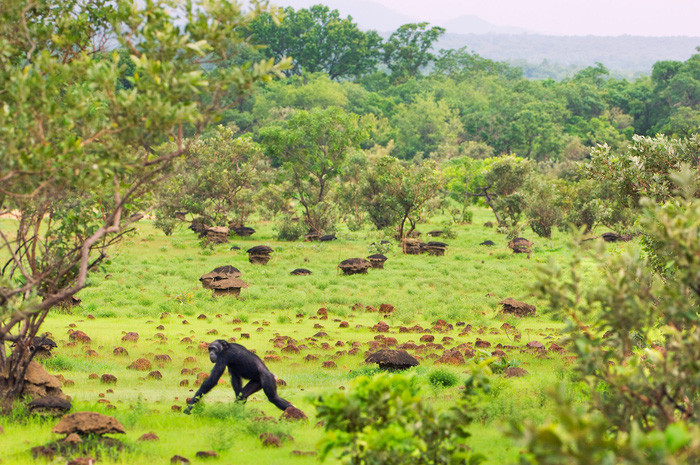Stressful life makes people stand upright
Millions of years ago, when changing the habitat from dense forests to savanna, human ancestors' bodies changed a lot.
When comparing chimpanzees - relatives of humans, living in dense forests and savanna, scientists recognize many difficulties of primitive people when changing their habitats.
Face high temperature
Xavan Fongoli in Senegal has become an ideal place for a multi-year study by Dr. Jill D. Pruetz, University of Iowa (USA) since 2000. After nearly 10 years, the team built a table of differences between the behavior of 2 species.

The temperature in Fongoli can reach 43.3 degrees Celsius. During the dry season, the wilderness often occurs with large and small fires leaving a dry area full of ash, stubborn branches - (Photo: Frans Lanting ).
The biggest difference lies in food sources. Chimpanzees in the jungle live mainly on fruits. Fruit is also a source of water in the daily diet. Because they do not have to worry about finding drinking water, they are free to look for new food sources.
In contrast, chimpanzees in Fongoli savanna desperately need water and only live around water sources in arid regions.
While the chimpanzee is active during the day, Dr. Pruetz finds that the chimp in the savanna needs 5-7 hours of rest. In the evening, chimpanzees in the forest go to bed early in the tree but in the Fongoli savanna, chimpanzees are still noisy until the night.
In the dry season, chimpanzees in the savanna shelter in small caves. When the rainy season comes, they are usually in newly formed lakes for hours.
The results of the study show that chimpanzees must fight a lot to adapt to the harsh life of moving to Fongoli savanna with the biggest challenge being very hot temperatures.
Life is more stressful
In 2014, Erin Wessling from the Max Planck Institute for Evolutionary Anthropology began conducting experiments to show how inside the savanna crystalline body was under pressure.
Like humans, chimpanzees have indicators, especially in their urine, that indicate their health status.
For example, when stressed, their bodies secrete many hormones cortisol . The amount of c-peptide produced by the pancreas also indicates whether chimpanzees have enough food; The level of creatinine protein in the blood indicates the body's ability to remove water.

The way of the savanna is more straight than the forest chimpanzee.This change is to adapt to the high temperature life outside savanna - (Photo: Getty Images).
After analyzing 368 urine samples, Wessling found that cortisol hormone in savannas had higher concentrations. This shows that they suffer more stress in their daily lives.
The concentration of c-peptide shows that the savannas' diet is relatively adequate, although sometimes they have to eat more food to get enough calories.
The creatinine concentration in the savanna is also higher, indicating that life in savanna has caused them to lose a lot of water.
Recent research has been published in the Journal of Human Evolution.
People stand up straight, remove their fur

Human Hominin ancestor - can be similar to Fongoli savanna when living near water and the body drains more sweat - (Photo: Frans Lanting).
According to The New York Times, for scientists studying the evolution of mankind, chimpanzees in Fongoli savanna show significant similarities to human ancestors millions of years ago.
The first member of our group is hominin, almost like chimpanzees, with fur, living in the jungle and moving with their knees.
When the savanna expands, hominins must transform their habitats into arid regions like Fongoli.
From now on, for hominins looking for food is not the biggest challenge, but instead faces high temperatures.
Hominins may have used the same method as Fongoli savanna like living near water sources or moving activities from day to night.
At the same time, hominins are also under pressure until the body develops new features to better adapt.
First of all, humans develop skin glands that help to get rid of sweat better. Next, the hominin must move to stand upright. Dr. Peter Wheeler of John Moores University (UK) said that upright posture will make them easier to live in a dry environment, especially to help the body cool.
Dr. Pruetz said that these changes in body and lifestyle are the foundation for later human evolution.
- When stress should eat a lot
- Women are less seduced by stressful work
- The disease causes at least 80,000 people on Earth to travel on four feet
- Mice stand bathing like people in Peru
- How horrible is the most stressful job?
- Kindness helps prolong life
- How can a bicycle stand straight without falling?
- Sitting upright when working will be smarter
- Video: The fishermen build themselves sleeping in the seabed
- Mobile phones repel human evolution
- How to extend your life at work
- Why stand still a bit tired than walking?
 Discovered an ancient centipede fossil 99 million years old
Discovered an ancient centipede fossil 99 million years old Discovered bat-like dinosaurs in China
Discovered bat-like dinosaurs in China Discovered a 200-year-old bronze cannon of the coast
Discovered a 200-year-old bronze cannon of the coast Discover 305 million-year-old spider fossils
Discover 305 million-year-old spider fossils